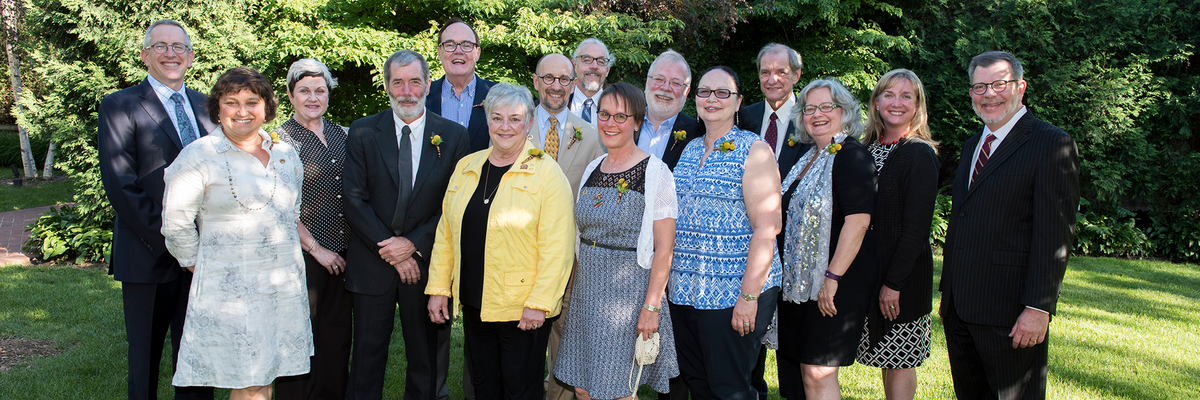
Recipients are pictured above with President Eric W. Kaler, Professor William Tolman, chair, President's Award for Outstanding Service Review Committee, and Vickie Courtney, director, University Awards and Honors, at a reception at Eastliff on June 16, 2016 (Colene Blank attended on behalf of recipient David Blank who was unable to attend the reception).
David Blank
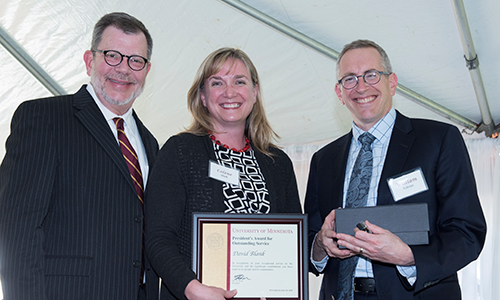
David Blank, professor, Department of Chemistry, College of Science and Engineering (CSE), University of Minnesota Twin Cities, is described as a top-notch researcher and award-winning teacher. He joined the University in 2000. Blank’s service to the University, college, the Department of Chemistry, and the public is exceptional. He is credited with the creation, development, and leadership of one of the most impactful outreach activities in the University’s history – the University of Minnesota’s Energy and U Show, which was created in 2006. The original idea was to introduce K-12 students to science and engineering through a series of scientific demonstrations focused on the transformation of energy. The show started as a single performance for about 200 students and parents. Today, the show is performed in the Rarig Center for four full weeks every year to an audience of over 13,000 3rd – 6th grade students. To date, the show has been performed for over 50,000 students. He also led the design and implementation of a new series of chemistry courses specifically tailored for students interested in the life sciences – these innovative courses will serve as a model for other institutions wanting to develop similar courses. Blank has served as the director of undergraduate studies for chemistry since 2010. He has served as chair of the Chemistry Undergraduate Curriculum Committee, the Honors advisor for chemistry majors, and member of the CSE Curriculum Committee and the Senate Committee on Student Affairs. In the past five years alone, Blank has published more than 15-peer reviewed research papers and received more than $1.7 million in federal research funding. One person wrote, “Professor Blank is a thoughtful collaborator and innovative leader. He is an excellent example of service to both the University and its larger community.” *Blank's award was accepted by Colene Blank on his behalf
Colin Campbell
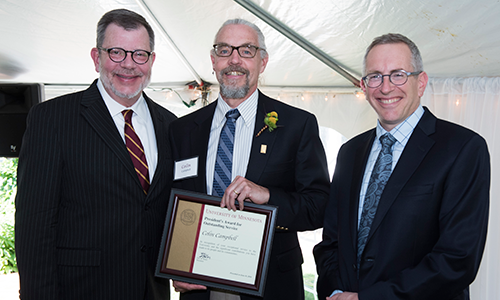
Colin Campbell, associate professor, Department of Pharmacology, Medical School, University of Minnesota Twin Cities, has served the University since 1992. He is described as devoted, accomplished, and an innovative contributor to the service and outreach missions of the University. Campbell has dedicated his professional life to understanding mechanisms underlying DNA damage and repair – critical cellular processes relevant in many disease states, including cancer. He has been and continues to be an outstanding teacher, advisor, and advocate, and a trusted mentor to students. In addition, he has made significant contributions to the research and teaching missions of the University. He has published over 40 peer-reviewed publications in high-impact biomedical journals, and has secured numerous lines of federal and foundation funding during his research career. His service to University governance is exemplary. He has served as a member on numerous department, collegiate, and University committees (too many to name), and as chair of several. He has emerged as a true leader in faculty governance. In his most recent role as chair of the Faculty and Senate Consultative Committees (FCC and SCC), Campbell has worked to help shape campus dialogue and institutional policy on critical issues of the day, including diversity and gender equity, freedom of speech and academic freedom, campus safety, and institutional investments in “Grand Challenges.” He is only the second faculty member in University Senate governance history to chair the FCC and SCC two years in a row. One person wrote, “Professor Campbell has a penchant for superhero shirts and wears them often. I have discovered that they are quite appropriate attire for Colin. While appearing to be the quintessential laid-back research scientist, Colin is actually quite heroic in regard to his service and leadership with the University. He has, indeed, demonstrated superhuman capabilities of moving mountains where it did not seem humanly possible. He consistently places the University as a whole at the center of his priorities, demonstrating an incredible dedication to the University and its core mission.”
Priscilla Day

Priscilla Day, professor, Department of Social Work, College of Education and Human Service Professions, University of Minnesota Duluth (UMD), is described as a generous and patient educator, an excellent advisor, and a dedicated mentor, who is deeply committed to the University community. She has provided outstanding service to the University as a faculty member, department head, director of a center, and as a student. Day was among the first students in UMD’s current Master of Social Work program and returned as a faculty member in 1993. Much of her work is concentrated on social justice and focuses on many of our most vulnerable persons in our society, including children and American Indian communities. Day is recognized as a national leader in American Indian child welfare. She is credited with leading her department in its efforts to recruit, retain, and graduate American Indian students, many of whom are now leaders within tribal human service agencies across the region. She has served seven years as department head, once from 2000 to 2003, and a second time from 2012 to the present. For the last ten years, Day has served as director of the Center for Regional and Tribal Child Welfare Studies where she has served students, the University, and the community in exceptional ways. Under her leadership, the University has received more than $8.5 million in external grants and Title IV-E Child Welfare contracts. More than 125 students have been supported with $2.3 million in student stipends. The department graduated 128 child welfare scholars since the first IV-E contract, 23% of which are American Indian. She has served on many department, UMD campus, and University committees, including the Program Prioritization Committee, President Bruininks’ Children’s Summit Planning Committee, and the Advisory Panel for the Gable-Skogmo Endowed Chair in the School of Social Work, to name a few. One person wrote, “Her service has transformed the lives of students; strengthened the department, college, and University; and through her outreach efforts on the local, regional, national and international levels, brought significant recognition to the University of Minnesota.”
Lisa Fitzpatrick
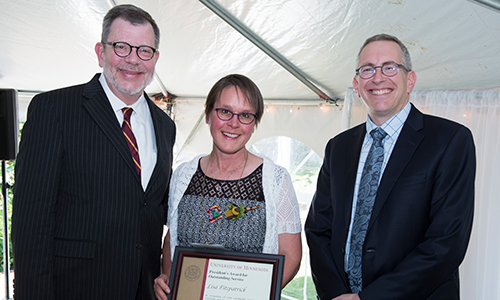
Lisa Fitzpatrick, director, Viz Lab and Motion + Media Across Disciplines Lab (MMAD Lab), School of Fine Arts, University of Minnesota Duluth (UMD), fosters collaboration across disciplines, forges connections between people that might otherwise not meet, and brings faculty, staff, and students together to help them produce innovative research they could never create working alone. She is called an ambassador for higher education. The labs she directs are considered to be the nexus of interdisciplinary and creative research on the Duluth campus. Her effort to connect outside of the University is equally as impressive. Her support for an annual UMD IT event called Steps to the Future, a higher education college/career fair that targets the greater Duluth community, and specifically, families who might not always consider college as a possibility, is highly successful due to Fitzpatrick’s fun, eye-catching equipment, such as 3D printers and virtual reality video games that have been built and developed in her labs. She also works to make connections between UMD and the local community through the service and resources that the MMAD Lab and Viz Lab can provide. Fitzpatrick has worked tirelessly with Duluth’s Great Lakes Aquarium and UMD students to create interactive exhibits that allow aquarium visitors to explore topics related to the various invasive and non-native aquatic species that are in the Great Lakes. In addition, she is actively involved in projects at the Duluth Children’s Museum and the Duluth Art Institute. Because of her fluency in multiple languages, she is often instrumental in helping UMD researchers form international connections. One person wrote, “What Lisa does in her job is impressive and represents the highest level of efficiency. But it’s how Lisa does her job that is her most impressive feat. She accomplishes all this with a smile, a sly turn of a phrase, good humor, endless patience, and a desire to make sure the faculty and students get what they need to further their work.”
Elaine Hansen
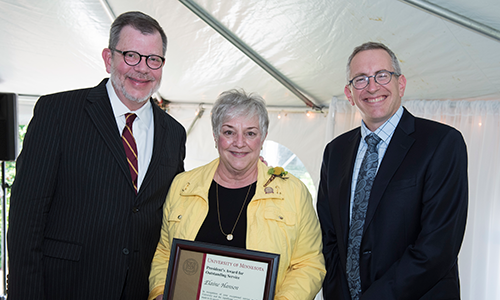
Elaine Hansen, described as a remarkable leader and role model, is the director of the UMD Center for Economic Development (CED), and regional director, NE and NW Small Business Development Centers. Under her leadership, the CED has become the premier regional Small Business Development Center in Minnesota. Hansen works tirelessly to create and improve programs to promote economic development in Minnesota. Her outreach includes working with other University of Minnesota campuses, eight MnSCU campuses, and the Native American community. She also extends her time and energy to special interests, such as women entrepreneurs, youth leadership, and financial literacy. Hansen has demonstrated an unusual commitment to the University community through her passion to mentor and encourage others to grow and excel. She takes the time to visit high school classrooms to teach financial literacy, facilitates Rotary Youth Leadership Award (RYLA) programs, and teaches classes on political advocacy, ethics in economic development, and business finance. She is credited with co-founding the Duluth Professional Women’s Network, which was started in 1992. In February 2015, Hansen accepted the additional responsibility of acting as interim vice chancellor of finance and operations, and interim director of finance at UMD while continuing her role as director of the CED. By October of 2015, she had addressed the budget issues at UMD, as well as assisted in the Human Resource Department. In addition, Hansen manages, maintains, and hosts the Annual Joel Labovitz Entrepreneurial Success Awards. One person wrote, “Elaine Hansen is an amazing, dedicated, hardworking, self-sacrificing person. The University of Minnesota has greatly benefited from her tireless efforts to make a difference not only for the U of M, but also in our community, region, and state.”
C. David Hollister
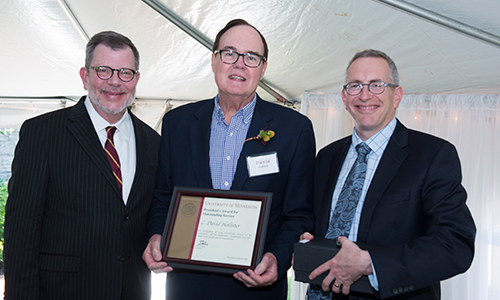
C. David Hollister, professor, School of Social Work, College of Education and Human Development, University of Minnesota Twin Cities, started his illustrious career in 1971 as an associate professor in the School of Social Development at the University of Minnesota Duluth, where he served in several roles, including interim dean of the School of Social Development. In 1980, he joined the faculty in the School of Social Work on the Twin Cities campus, where he has held almost every leadership position in the school, including director, director of graduate studies, doctoral program chair, and joint program advisor. He is credited with helping to lead the School of Social Work into the College of Human Ecology (1983); incorporating a Youth Studies program into the school; and, developing a dual master’s degree with the Humphrey School of Public Affairs – the Master of Social Work-Master of Urban and Regional Planning program. His work in the area of international social work is compelling. He is one of the founders of the Inter-University Consortium for International Social Development, an organization that promotes international content and social development perspectives in social work education and research. Hollister’s research in recent years has focused primarily on refugees and immigrants. In addition, he has led students on academic international experiences, including study tours to Viet Nam, Chile, Turkey, and Northern Ireland. He holds an adjunct appointment in the Humphrey School of Public Affairs where he taught the Neighborhood Revitalization course for 13 years and where he continues to serve on the MURP faculty committee. He also held an adjunct appointment in the School of Public Health from 1980-1996. One person wrote, “It is from him that I learned what it means in everyday practical terms to be a ‘servant leader’ in this community – to be of integrity, consistency, thoughtfulness, attentiveness, and caring – for colleagues, students, and community.”
James MacDonald
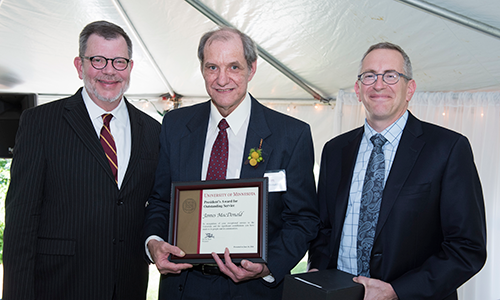
James MacDonald is the director of information technology in the College of Science and Engineering at the University of Minnesota Twin Cities. For more than 30 years, he has dedicated his career to advancing the University through innovative technology and unwavering leadership. Faculty, staff, and students have benefited from his innovative ideas to make the University more efficient, his pioneering approach to keep the University on the cutting edge of technology, and his creative ideas for funding these much needed services, which is why he is considered to be one of the best IT managers at the University. During his tenure, MacDonald was confronted with some of the first “hacker” attacks aimed at the University. Once the hack was discovered, he and his team analyzed the data left behind and found that the hacker had successfully broke into several Department of Defense computer systems, including the Naval Air Warfare Center, Naval Air Test Center, and a number of Joint Chiefs of Staff and Navy servers. He contacted the FBI and worked with their cyber-crimes office in San Francisco to provide them with the information his team had collected, including the usernames the hacker used to get into the sensitive government systems. This experience led MacDonald to implement cyber security standards that influenced the first University-wide policies on IT security. Since that first hack, he has repeatedly acted as a first-responder to high-level attacks. MacDonald is described as an extraordinary mentor and is credited with providing outstanding training and development for staff. He also has been active in University Senate governance – serving for six years on the Senate Committee on Information Technologies, two of which he served as chair. One person wrote, “The initial excitement that each of us had individually about nominating Jim for this award was magnified in our discussions as we all heard new stories of Jim’s contributions to the department, college, or University of which we were previously unaware – “Jim did that too; I didn’t know,” was a common refrain. This speaks to both Jim’s tremendous impact and his inherent modesty.”
James Mullin
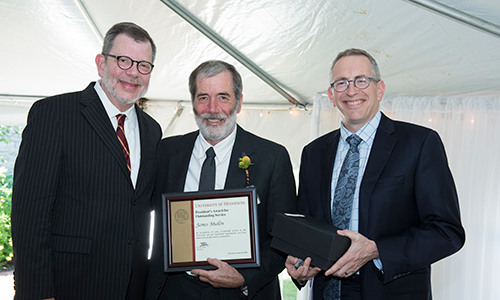
James Mullin served as a senior engineer for more than 20 years at the St. Anthony Falls Laboratory (SAFL), College of Science and Engineering, University of Minnesota Twin Cities. He was hired to help develop the first experimental facility ever built to study the interplay of crustal subsidence and sedimentation – the basic processes that create the earth’s sedimentary strata, which is known as Experimental EarthScape (XES) and is called the crown jewel of SAFL’s experimental facilities. He led the development of highly innovative robotic data-collection carriages, referred to as the Magic Cart, which has had a tremendous impact on research and innovation not only at the University, but also all over the world. Under Mullin’s leadership, SAFL has built systems for eight universities around the United States and the world, and for two major oil companies. These data-collection carriages have generated almost $2 million of external sales revenue for the University of Minnesota. Throughout his career, he has imagined and built some of the most innovative laboratory instrumentation and data collection systems of their kind in the world. These types of innovations he has developed are very complex systems that blend computer programming, control engineering, structural design and fabrication, and mechanical and electrical engineering. One person wrote, “Jim is that rarest of creators – a person who can both imagine solutions that are stunningly original and creative, and then turn around and build what he has dreamed to exacting standards. He worries tirelessly about how to build things the right way, and he sees potential problems, and their solutions, before anyone else does, and before they happen. His ferocious and unflagging commitment to quality has rubbed off on everyone around him, and perhaps more importantly, on the hundreds of students and visitors from all corners of the globe, academia, government, and industry, whom Jim has worked with during his many years at SAFL.”
Lee Munnich
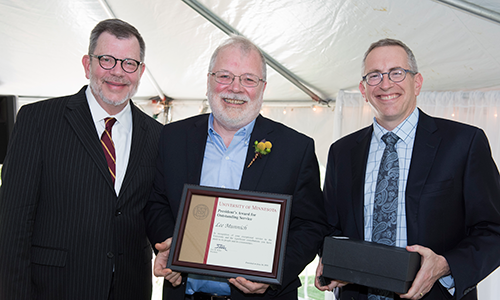
Lee Munnich, senior fellow, Humphrey School of Public Affairs (Humphrey School), University of Minnesota Twin Cities, brings more than 20 years of state and local government experience to the study of public policy issues at the University of Minnesota. Prior to joining the University, Munnich had an outstanding career in public service, including serving as a Minneapolis City Council member, the research director for the Minnesota Business Partnership, and deputy commissioner of the Minnesota Department of Trade and Economic Development. His exceptional contributions in the field of transportation policy and economic development have led to new areas of expertise, new graduate programs, and countless research projects. His focus is on transportation policy and finance, congestion pricing, rural road safety, regional economic development, and industry clusters. Munnich is credited with advocating congestion pricings as a solution to traffic congestion. He helped establish Minnesota’s first high occupancy lane tolls on I-394 and subsequently became a national leader in the field. He has published numerous papers on political and institutional issues associated with congestion pricing. He also has become known worldwide for regional industry cluster studies, which have shaped economic development policies at both the state and local level in Minnesota. Recently, he and others at the Humphrey School have been running the Transportation and Economic Competitiveness Project (TECP), studying concepts such as driverless vehicles, advanced freight transportation systems, and alternative transportation infrastructure mechanisms. His 25 years of service and contributions to the University of Minnesota are enduring. Munnich retired from his position as the director of the State and Policy Program in 2015, but he continues to teach and to do transportation and economic development research at the Humphrey School part time. One person wrote, “Lee Munnich has been an indefatigable and effective servant of the state, the metropolitan area, and the University. He brings a warm, optimistic, and infectious enthusiasm to everything he does. I cannot think of anyone more deserving of this very high award than Lee Munnich.”
Windy González Roberts
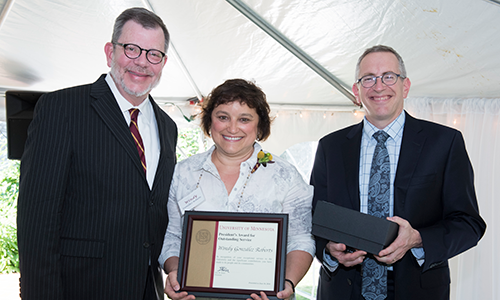
Windy González Roberts, Spanish teaching specialist, Division of Humanities, University of Minnesota Morris (UMM), has demonstrated outstanding service for more than 11 years. She is described as an enthusiastic teacher, a lively colleague, and a generous faculty member who is deeply engaged with the broader Morris community. Her outreach activities are extraordinary. She has been instrumental in establishing a dynamic English as a Second Language program for Spanish-speaking adults and a Jane Addams program focused on intercultural dialogue and friendship. The outreach programs she runs enrich the UMM Spanish program tremendously by providing students opportunities for language immersion and intercultural exchange. She also serves as the faculty advisor for the Spanish language student organization Vamos Juntos. Roberts serves on the boards of existing local non-profits and started a non-profit that works to bridge the Latino and broader community. In addition, she is active in campus and University governance. Currently, Roberts serves as a member of the Faculty Development Committee, the Humanities Division Advisory Committee, and the Commission on Women. She also is the founder and organizer of the Multicultural Women’s Reading Club. One person wrote, “Many have said that meeting Windy and working with her has changed their lives. I know they are right and am very grateful for all the extraordinary service Windy has provided and continues to provide. Her selfless service makes UMM a better university, one whose mission is not only to teach students how to be responsible global citizens, but also to share the rich and enriching resources our campus can provide to the surrounding communities of Greater Minnesota.”
William Robiner
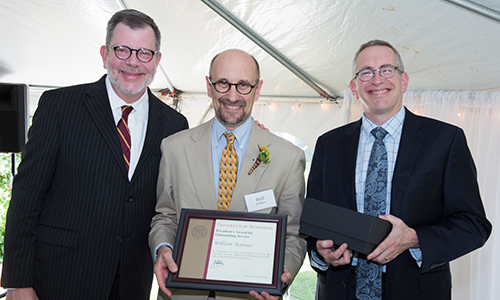
William Robiner is a professor in the Departments of Medicine and Pediatrics, Medical School, University of Minnesota Twin Cities. Since 1985, he has maintained a dynamic clinical practice, provided academic leadership, and participated in broad scholarly endeavors. He serves as the director of Health Psychology and the Psychology Internship Program in the Medical School. Robiner is described as an outstanding teacher, mentor, clinician, and researcher. He is someone who embodies all of the qualities to which clinical faculty members should strive: integrity, self-sacrifice, dedication to training and trainees, a focus on clinically related research, and tireless commitment to the University and to their field of study. Robiner is the first board certified clinical health psychologist in the State of Minnesota. Because of his initiative to meet the needs of patients, he played a key role in developing a support group for transgender individuals in 1979, which became the first step toward developing the comprehensive transgender health program that exists today. In the late 1980s, he organized the first mental health conference in Minnesota about psychological aspects of HIV/AIDS in conjunction with the Minnesota Psychological Association during the crucial early stages of the epidemic. In addition, he is a founding member of Minnesota APA-Accredited Psychology Internship Centers. He serves or has served on numerous committees, including chair of the Psychology Standards Committee, member of the Internal Review Committee for Mortuary Science Program, and member of the Physician Well-Being Initiative Task Force, to name just a few. He also serves as a member or chair of several professional committees locally and nationally. One person wrote, “Dr. Robiner exemplifies the highest standards in the field and in ethical practice through clinical service delivery, research and scientific inquiry, teaching and mentorship, leadership, and volunteerism. He is passionate about educating the next generation of psychologists, and shares his wealth of knowledge with others at all levels. He is articulate, creative, and a born leader. He is a visionary who works tirelessly on behalf of others.”
Susan Warfield
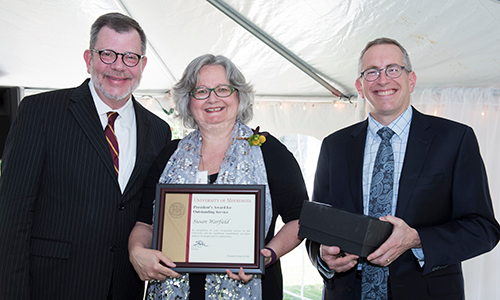
Susan Warfield is the program director of the Student Parent HELP Center, Office for Student Affairs, University of Minnesota Twin Cities. For more than 15 years, she has provided extraordinary support to undergraduate students at the University of Minnesota. As program director, she assists undergraduate student parents in eliminating the multiple financial, social, academic, and family service-based barriers that students with children struggle with daily. She is described as extremely caring and committed to ensuring that some of our most vulnerable students will have the resources and support they need to graduate and be successful in the work place and as parents. Warfield is actively engaged at the national level with professional organizations serving student parents and coaching colleagues from a wide range of institutions who are attempting to launch student parent programs. She and her staff have founded or co-founded two of the three higher education professional organizations working with student parents: the Higher Education Alliance for Students with Children and the NASPA Adult Learners and Students with Children Knowledge Committee. Warfield also has founded or co-founded two University committees: the Vice Provost’s Committee on Non-traditional Student Affairs, which lasted for five years and recognized veterans, student parents, and older than average and first generation college attendees; and, the Lactation Advocacy Committee, an ad hoc committee seeking to improve lactation resources on campus for all students, faculty, and staff. Under her leadership, the Student Parent HELP Center was awarded the first annual NASPA Outstanding Undergraduate Student Parent Program award in March 2016. One person wrote, “Susan is one of the most dedicated professionals I’ve had the pleasure of working with at the University of Minnesota. Simply put, Susan is an inspiration. She is one of those people who tirelessly gives of herself and advocates for the wellbeing and success of our underrepresented student population. Susan exudes excitement and enjoyment when working with students. She has poured her heart and soul into her work, which shows through the profound impact she has made in the lives of hundreds of students, faculty, and staff on campus as well as the significant work she has done nationally to increase awareness and resources for student parents in higher education.”